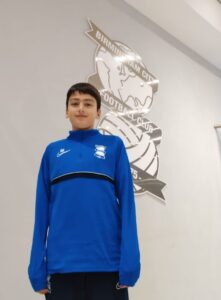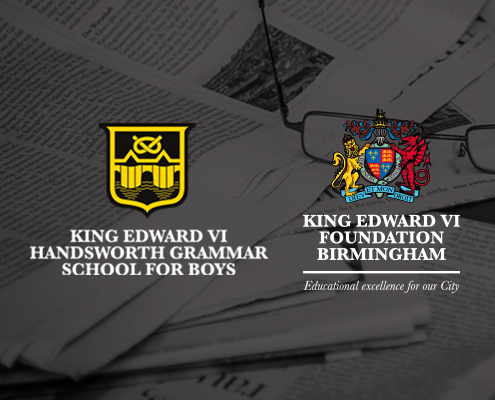Remembrance Assembly 2021
King Edward VI Handsworth Grammar School for Boys held its annual Remembrance Assembly in Big School on Friday 12th November 2021. We were able to hold the Assembly with social distancing so that Year 7 attended in person whilst the remainder of school had an extended Form time and we all observed a 2-minute silence at the same time. The Reverend Dr Bob Stephen who is Chair of the Governing Body and Rector of Handsworth led the act of Remembrance. The Headmaster delivered a very timely and thought-provoking introduction which highlighted the necessity to work towards peace in all we do. He highlighted that important facets of life such as showing respect and tolerance of each other, being kind and compassionate and celebrating our differences are all highly significant steps on the road to peace. He emphasised the need for the values of peace, freedom and hope in all we do as well as focusing upon the themes of unity and compassion.
Mrs Harvey delivered the address and the text is included here:
Year 7 Remembrance Assembly Address, 2021
Good Morning.
As you sit here today, Year 7, in this Remembrance Day assembly, you could be forgiven for thinking that the First World War is merely an episode in history for you; an episode almost as remote as the Romans, or the Six Wives of Henry VIII. Interesting to learn about, but somehow nothing directly to do with you. It took place over a hundred years ago- no one is alive today who took part in it, and even the oldest super-centenarians in our society weren’t even born when it ended.
Equally, the numbers often quoted might seem unimaginable, and therefore unreal: over 700,000 British soldiers died between 1914 and 1918. The sheer size of the number somehow takes some of the significance away from it. It’s hard to imagine 8 Wembley Stadiums filled to capacity, but that’s how many people 700,000 is. Or, to put it another way, it’s nearly 5,000-year groups of Year 7s. It’s so big it becomes a blur.
But now I want us to focus in a little more, to close the distance and bring a human face to what happened over a 100 years ago. As you sit here in Big School, in a room where the young men from this school who fought from the fields of Passchendale and the Somme to the shores of Gallipoli off Turkey sat before you, as you look at the beautiful stained glass window, built in 1921 as a memorial to the Handsworth Grammar School boys who died in the conflict, I want to tell you a story about a young man who left for France in 1914, and came back in 1919- but more of that later.
My grandfather was called Albert William Durrant. He was born in 1895 while Queen Victoria was still on the throne, and lived with his family not very far from here in West Bromwich, in Ault Street, which still exists today. He had 4 brothers and a sister, and took his role as the big brother very seriously. You all wear the Staffordshire knot with pride on your blazer badge, and my grandpa was a proud Staffordshire lad as West Bromwich was located in Staffordshire in those days as the county called the West Midlands hadn’t been created. He had relatives who lived in Birmingham, and would have travelled up and down the Soho Road frequently, passing many of the same old buildings you pass today. His favourite hobby was football and he loved to watch his beloved West Brom at the Hawthorns just up the road, which was opened in 1900. Footballers in those days were all amateurs and he dreamt of joining them, but unfortunately, in 1906, disaster struck. Both of his parents died within a year from consumption, a disease of the lungs which we now call tuberculosis. My grandpa and his brothers and sister had to go and live with the other orphans in the workhouse on Hallam Street, which is on the site of Sandwell Hospital today. It was a difficult time for the family, but when he was 13 he was able to leave school and go to work in a factory. The small wage that he earned enabled the brothers and sisters to leave the workhouse and go and live with an auntie, and the factory he worked in, Kenrick’s, still exists today, the old red brick building amongst the warehouses just off the M5 up the road from here.
But he needed a better job as the main breadwinner so that his brothers and sisters could carry on at school, and in 1913 he joined the army. He was a good soldier by all accounts, although his army records show that he was sometimes fined for swearing, or for being late back to barracks after a weekend’s leave. A normal 18 year old, the same age as the Year 13s you see in school. His regiment, The South Staffordshire regiment, was deployed to France in 1914, and was sent to the Western front. My grandpa was soon transferred to the Royal Army Medical Corps and spent the next 4 years as a medical orderly, helping to care for the constant stream of young men disastrously injured by the brutal fighting.
They say that army medics are especially brave as they are the only people on the battlefield with their backs to the enemy. The technological advances in weapons such as tanks, machine guns, aeroplanes and chemical warfare meant that the injuries seen in the Great War were new and terrible. Albert worked at casualty clearing stations just behind the front line where the injured were triaged and assessed. The shells rained down around him, and he worked in the most basic of conditions in a tent with no electricity or water to provide emergency medicine. They had basic drugs, had to wash and re-use bandages, and antibiotics wouldn’t be invented for at least another 30 years. He learnt how to dress wounds, to put splints on broken limbs, and as the fighting intensified, to amputate arms and legs and deal with the shell shocked.
Mental health was poorly understood in those days, but he spent long nights comforting the terrified and broken, wrote letters to their families in his beautiful handwriting, and cheered them up with silly jokes and talent competitions. Sometimes the stretcher bearers would bring in badly injured enemy soldiers, and they were cared for too. He was barely 20 years old and yet he had seen so much death and destruction. But he carried on, doing his best to be a good medic and a good comrade. On one occasion, he even managed to meet up with all of his brothers, who were also serving in France by then. He borrowed an ambulance and it was the only time in his life he ever drove a vehicle. Like all good brothers, they managed to have an argument during that meeting, but they made up after an impromptu kickabout. Football was still important! Amazingly, he and all of his brothers survived the war, although none of them would ever return to France. When the war ended in 1918 he had been away from home for 4 years already, but he was not allowed back straightaway.
Before he could come home, he had to work through the Spanish flu, the pandemic which swept through the world at the end of the Great War, causing 500 million cases and possibly up to 100 million deaths throughout the globe by 1920. Its lessons never left him; I was only 6 when he died, but I have a strong memory of him showing me how to wash my hands, and insisting they were clean before tea. He had seen first hand the horrors of unchecked infection, and he was a stickler for cleanliness.
He finally came home in 1918, married my granny who wrote to him every week during the war, and led a quiet life. He lived until the ripe old age of 80, and enjoyed smoking his pipe to the end. As a family, we have the cards and letters they wrote to each other during their 4 years of separation, and what stands out, in the most amazing way, as well as the details of the war – apparently my great granny was terrified of Zeppelins over west Brom- is the delicious ordinariness of my grandpa. Sometimes he’d send a thank you for the scarf or cake he’d received, other times he would send a picture postcard or a hand-drawn picture. His letters were filled with the things he missed- he dreamt of a day at the seaside or a trip to Kinver Edge. He was no superhero in a cape, but an example of how an ordinary lad can do amazing things when he puts one foot in front of another and commits to doing something well. To me he was just grandpa, who used to take me to see the horses in the field, or practise tying bows with the laces of his boots, but I see now that the lessons he learned informed every aspect of his life: he tried his best at everything he did.
This is something we can all learn; not all of us, thankfully, will be called to give service in the theatre of war, but make no mistake, the service we can offer is just as important. Being the best members of our families, school and community we can be is so important. Living our lives with the values of community, aspiration, respect, endeavour and service, not only here in school, but as we get older, will enable us to have a positive impact on everyone we meet and everything we do. Our remembrance should be active not passive; the best way for us to honour the fallen is to do something positive with our lives and to be the examples of the future.
The Senior Prefects all attended and Harikesh, Rohit, Cameron and Nyrun took an active part in the Assembly by reading poems and reflections and laying a wreath at the stained-glass window to commemorate the School alongside Mr Farrell who was representing the Bridge Trust Society. It was a very special event and a fitting tribute to the Old Boys whose names are listed on the memorial plaques in Big School.
The loss of life in war is often hard to comprehend, yet we still witness bitter disagreements and conflicts, often on a much smaller scale, in our own communities and lives. I doubt many of us like conflict, although we sometimes need to take a courageous stand for what we believe is right; we can, of course, disagree graciously and we can be the first to seek reconciliation. I hope that, as adults, we can lead by example and teach our children to be at peace with themselves and with others, and to forge a more peaceful world.
Haec Olim Meminisse Iuvabit
















